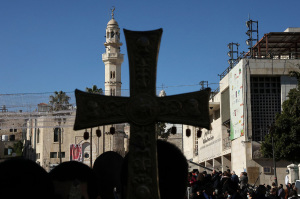Middle East and Africa Christians Called to Fulfill Vital Role for Religious Liberty
An alliance of Christian organizations has urged Christians across North Africa and the Middle East to realize the vital role they can play in bringing about justice for all peoples.
The Religious Liberty Partnership (RLP), which is a coalition between Christian Solidarity Worldwide, Open Doors, Release International, and the World Evangelical Alliance, has also expressed its concerns over the violence used by governments in the region against protestors over recent months. The RLP urged governments in the Middle East and North Africa to ensure all citizens in their countries are granted the basic right to adopt the religion or belief or their choice.
In the RLP statement released this week it stated: “As members of the Religious Liberty Partnership (RLP), we have closely observed the protests held in many Middle Eastern and North African countries.”
It added: “We welcome the widespread calls for greater freedom and strongly endorse these aspirations. We believe that freedom, equality and justice for all are essential for the development and cohesion of societies.”
The RLP statement has been released following months of violence and unrest in North Africa and the Middle East. Widespread demonstrations have pushed for a change in governance in numerous countries, and a number of those in power have used violence to hang on to their positions of power.
Libya
Colonel Gaddafi, who has ruled in Libya since a military coup in 1969, has been one of the most prominent leaders using troops in an attempt to quash a nearly 3-month-old revolt.
Libyan protests commenced in February when demonstrators broke into a housing project the Gaddafi government was building and occupied it. Gaddafi responded with a $24 billion fund for housing and development to try and calm protestors. However, just a month later, more widespread demonstrations began when according to Human Rights Watch police seized relatives of those killed in an alleged 1996 massacre at Abu Salim prison. Protesters have also cited high unemployment and infringements of their rights and freedoms as reasons for standing up against the Gaddafi regime.
Syria
Unrest in Syria began in March after a number of teenagers were apprehended for writing anti-government graffiti. That sparked protests and a crackdown by the government. As the situation intensified, demonstrators demanded for the country’s regime to stand down.
Egypt
In Egypt a popular uprising began on January 25, 2011. The uprising was mainly a non-violent civil resistance, with demonstrations, marches, acts of civil disobedience, and labor strikes all taking place. Millions demanded the overthrow of the regime of Egyptian President Mubarak. Despite being predominantly peaceful in nature, the revolution did involve some violent clashes between security forces and protesters. On February 11, Mubarak resigned from office.
Egyptian Christians are hoping that parliamentary elections in September will establish greater democracy and freedom than what they enjoyed under ousted President Hosni Mubarak.
Mervyn Thomas, Chairman of the RLP and chief executive of Christian Solidarity Worldwide said, “In observing the current events unfolding in many Middle Eastern countries I am excited at the possibilities for real progress to come from these events.
"Now is a great opportunity for Christians across the region to show that, as national citizens, they have a role to play in bringing about justice for all peoples and recognition that this cannot be achieved without full religious freedom.”





























